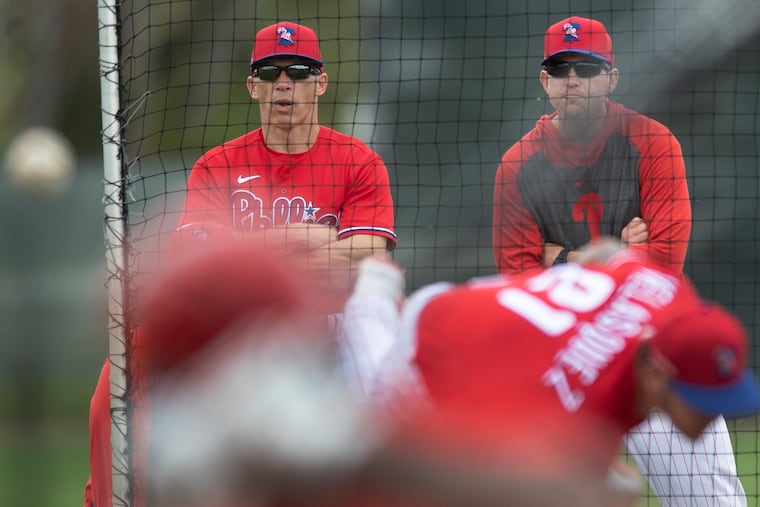Welcome to a pandemic-shortened Phillies season. Can you pitch for Joe Girardi? | Mike Sielski
The compressed regular season and the possibility of infection or injury will make for some tricky maneuvering for Girardi and his pitching coach, Bryan Price.

Over Joe Girardi’s 10 years managing them, the Yankees twice went 84-78, their worst record during his tenure.
The first time was in 2014. They had 10 pitchers start at least eight games for them that season, but only one, Hiroki Kuroda, who started more than 20. For a team that managed to finish second in the American League East, that’s a fair amount of rotation shuffling, whether because of injuries, ineffectiveness, or both.
It’s nothing compared with what Girardi faces now, with the Phillies, in this shortest and oddest of major-league regular seasons.
“There is no handbook for this for managers,” he said Thursday. “Managers weren’t necessarily trained how to handle a pandemic.”
There was no necessarily necessary in Girardi’s assertion. The coronavirus wiped away the final half-month of spring training, put the sport on hold for more than three months, and cut the regular season’s length by 63%.
“You look at it like you’re a team in the race with two months to go,” Girardi said. “You’re tied for a division [lead]. You’re tied for a wild card going in. Realistically, that’s what everybody is.”
Realistically, though, no manager can simply pretend that it’s Aug. 1, his team has 110 games under its belt, and he’s free to act accordingly.
It’s tempting to suggest that the season has gone from a 162-game marathon to a 60-games-in-66-days sprint, that a manager might use his pitching staff during this regular season just as he might during a postseason, relying more on his best starters and relievers, especially in important moments.
Why have the staff ace pitch seven innings one game, then have him rest for another four? Why not pitch him for two or three innings one day, then another two or three innings a day or two later? Or, why use him as a starter in the first place? Why not make him a quasi-closer?
It’s tempting, yes, but managers won’t have that luxury. Not immediately, at least, and maybe not at all. The risk is too great. Teams won’t be sprinting this season. They’ll be race-walking, trying to go all out while remaining grounded at all times.
As you may have heard, this has not been and will not be a normal baseball year, one in which a starter or reliever will have had a normal spring training, with a normal period of time to stretch himself out and prepare himself to carry out his particular role.
“Guys are in tremendous shape at that point, and they have been playing day after day,” Girardi said. “Pitchers have thrown 100 pitches. They’ve been on a normal five-man rotation and thrown three starts in 15 days. They don’t have that now.
“At this point, you have to watch for fatigue and signs as much as you’ve ever watched for in a season, just because players aren’t going to be in the shape they would have been had they had a normal spring training. So you have to be really smart.”
So what does intelligent deployment of a staff look like under these circumstances? There’s no way to know at the moment. Girardi said that he and Bryan Price, the Phillies pitching coach, plan to use a five-man rotation. But without the usual six or seven starts that they would get while in Clearwater, those pitchers will instead throw during batting-practice sessions and intrasquad games, simulating the conditions that they’re likely to face once the real games begin: throw 20 pitches, sit down for a few minutes, then return to the mound to throw some more.
If a starter gets to 60 pitches, or a few more than that, in a game, Girardi would consider it a job well done. And with major-league rosters having expanded to 30 players for the first two weeks of this season – that number will gradually decline to 26 – Girardi will have more arms and options at his disposal. He’ll likely need them.
Of the seven players the Phillies already have placed on the COVID-19 Related Injured List, or are keeping away from camp because of the protocols, four are pitchers: Aaron Nola, Hector Neris, Tommy Hunter, and Ranger Suarez.
Just in case you’ve forgotten (hey, we’ve been without meaningful baseball for a long time, and a lot has happened in the interim), Nola is the Phillies’ best starter, and Neris is their closer. And because of the unorthodox nature of a compressed season, the chances that pitchers will suffer more traditional injuries have presumably increased.
“You have to be responsible and understand where your pitchers are, how far your starters are built up, and what workload they’re capable of having,” Girardi said. “You can’t ask them to do more than they’re capable of.”
The trick will be figuring out the right request.